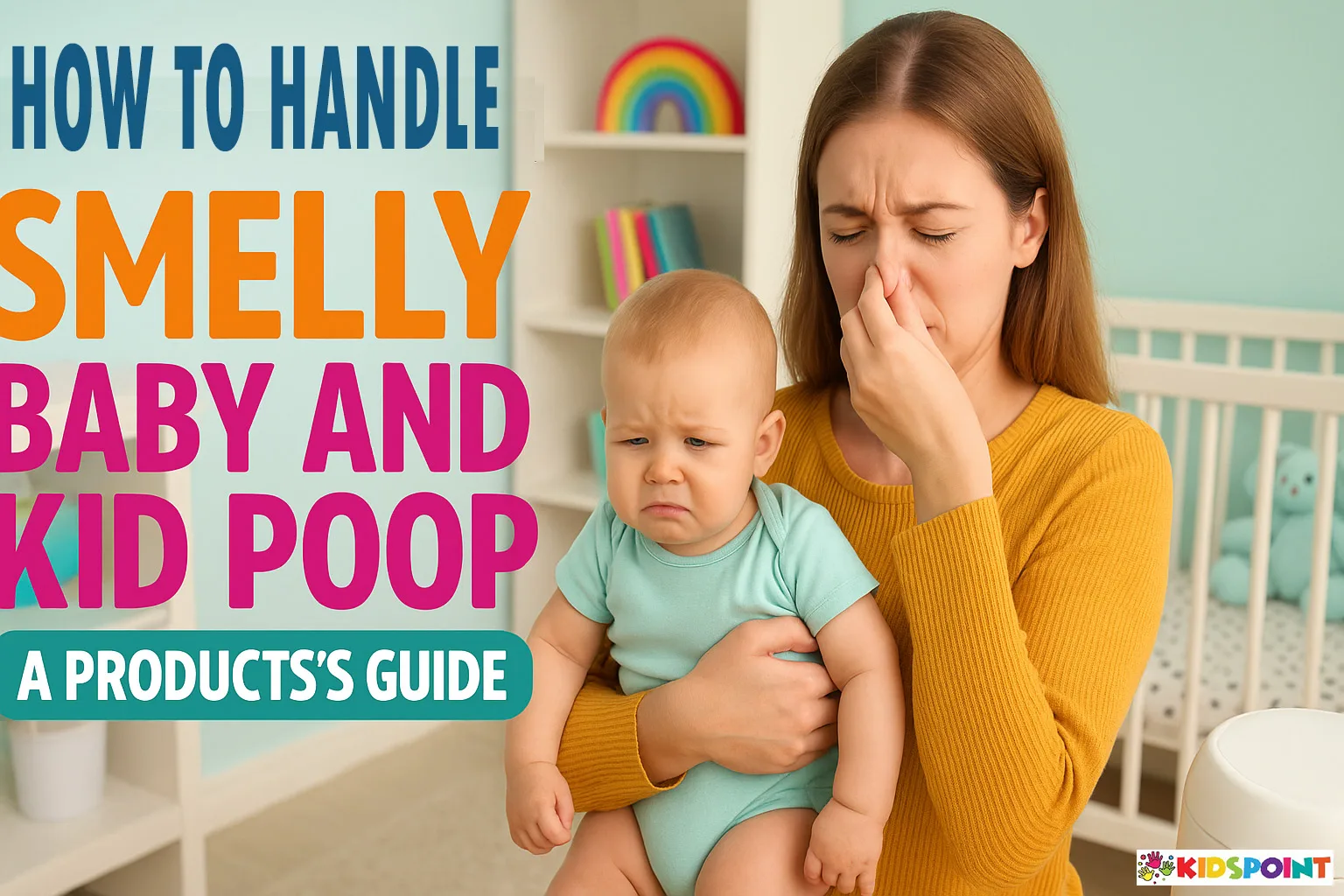Parenthood is a beautiful journey filled with precious moments, but it also comes with its share of challenges — and one of the most common (and sometimes toughest) is dealing with the smell of baby and kid poop. Whether you’re a new parent or caring for toddlers, handling smelly diapers and related products can be overwhelming.
At The Kids Point, we understand how important it is to maintain a clean, fresh environment while keeping your little one comfortable. This comprehensive guide will help you understand why poop can smell so strong, how to manage the odor effectively, and which products can help make this part of parenting easier.
Why Do Baby and Kid Poop Products Smell So Strong?
Before diving into solutions, it helps to understand why baby and kid poop smells the way it does.
- Digestive System and Diet: A baby’s digestive system is still developing, and their diet—whether breast milk, formula, or solids—affects the smell. Breastfed babies often have softer, less smelly stools, while formula-fed babies’ poop can smell stronger. Once solids are introduced, different foods (especially protein-rich or sulfur-containing foods like eggs and broccoli) can affect odor.
- Bacteria Breakdown: Poop odor comes mainly from the bacteria breaking down waste in the intestines, releasing gases such as hydrogen sulfide, ammonia, and other sulfur compounds that cause the characteristic smell.
- Health Factors: Sometimes strong odor can be a sign of digestive issues, infection, or food intolerance. If you notice a sudden change in odor accompanied by other symptoms, consult your pediatrician.
Common Challenges with Smelly Baby and Kid Poop Products
- Diapers and Changing Pads: Dirty diapers can emit unpleasant odors quickly. The fabric and absorbent materials may trap smells.
- Clothing and Bedding: Poop accidents can soak into clothes, blankets, or mattresses, causing lingering odors.
- Changing Area: Without proper ventilation or odor control, the changing area can quickly become unpleasant.
- Waste Disposal: Throwing away dirty diapers improperly can cause smells to linger in your home.
Practical Tips to Handle Smelly Baby and Kid Poop Products
Choose the Right Diapers
Not all diapers are created equal when it comes to odor control.
- Look for Odor Locking Features: Many modern diapers have special odor-blocking technology or activated charcoal layers that trap smells.
- Check for Breathability: Diapers that allow airflow can reduce moisture build-up and odor.
- Hypoallergenic and Sensitive Skin Options: Some diapers reduce irritation, which can also reduce the likelihood of diaper rash and smell.
At The Kids Point, we recommend trying a few brands to find one that works best for your child’s comfort and odor control.
Change Diapers Promptly
The longer a dirty diaper sits, the stronger the smell becomes. Changing diapers frequently is key:
- Change as soon as possible after soiling.
- Use wipes with mild scents or unscented wipes if your baby has sensitive skin.
- Clean the diaper area thoroughly to prevent bacteria build-up.
Use Diaper Disposal Systems
Special diaper disposal pails can trap odors better than standard trash bins.
- Sealed Containers: Choose containers with airtight seals.
- Odor Neutralizers: Some pails come with built-in deodorizing filters or cartridges.
- Empty Regularly: Don’t let waste build up for days — empty the container frequently to prevent odor overflow.
Maintain Proper Hygiene
Good hygiene minimizes odor and keeps your baby comfortable.
- Wash your hands thoroughly after each diaper change.
- Clean changing pads with disinfectant wipes regularly.
- Wash baby clothes and bedding immediately if soiled.
Use Natural Odor Absorbers at Home
To keep your home smelling fresh:
- Place bowls of baking soda near changing areas to absorb odors.
- Use activated charcoal bags in the nursery or diaper area.
- Consider essential oil diffusers with baby-safe scents like lavender or chamomile, but always ensure they are safe for infants.
Wash Soiled Clothes and Bedding Immediately
For poop stains and odors on fabric:
- Pre-rinse in cold water to remove solids.
- Use enzyme-based detergents that break down organic matter.
- Wash with hot water if fabric care allows.
- Repeat washing if odor persists.
Ventilate the Changing Area
Good airflow can drastically reduce odor buildup.
- Open windows when possible.
- Use a small fan or air purifier with a HEPA filter to circulate air.
- Avoid carpeted floors in changing areas if possible, as they can trap odors.
Product Recommendations from The Kids Point
To help parents effectively manage smelly poop products, here are some products we recommend:
Diapers
- Pampers Swaddlers: Known for excellent absorption and odor control.
- Huggies Little Snugglers: Offers a breathable design and a secure fit.
- Seventh Generation Free & Clear: Great for sensitive skin and eco-friendly.
Diaper Disposal Systems
- Ubbi Steel Diaper Pail: Durable steel construction with tight seals.
- Munchkin Step Diaper Pail: Easy to use and includes odor filters.
- Playtex Diaper Genie: Classic, affordable with multi-layer odor traps.
Cleaning Supplies
- Baby-safe Disinfectant Wipes: For quick surface cleaning.
- Enzyme-based Laundry Detergent: Like Tide Baby or Babyganics.
- Baking Soda and Activated Charcoal: Natural odor absorbers.
When to Consult a Pediatrician
Strong poop odors can sometimes indicate a medical issue:
- Persistent foul smell combined with diarrhea, blood, or mucus.
- Signs of discomfort or excessive gas.
- Allergic reactions or food intolerances.
If you notice these symptoms, reach out to your child’s healthcare provider promptly.
Dealing with smelly baby and kid poop products is an unavoidable part of parenting, but with the right strategies and products, you can keep your home smelling fresh and your baby comfortable.
Remember, frequent diaper changes, proper hygiene, effective odor-control products, and good ventilation are your best tools. At The Kids Point, we’re committed to providing you with helpful tips and reliable product recommendations to make parenting easier and more enjoyable.
If you’re struggling with any aspect of baby care or want more personalized advice, don’t hesitate to reach out to our community or consult your pediatrician.


